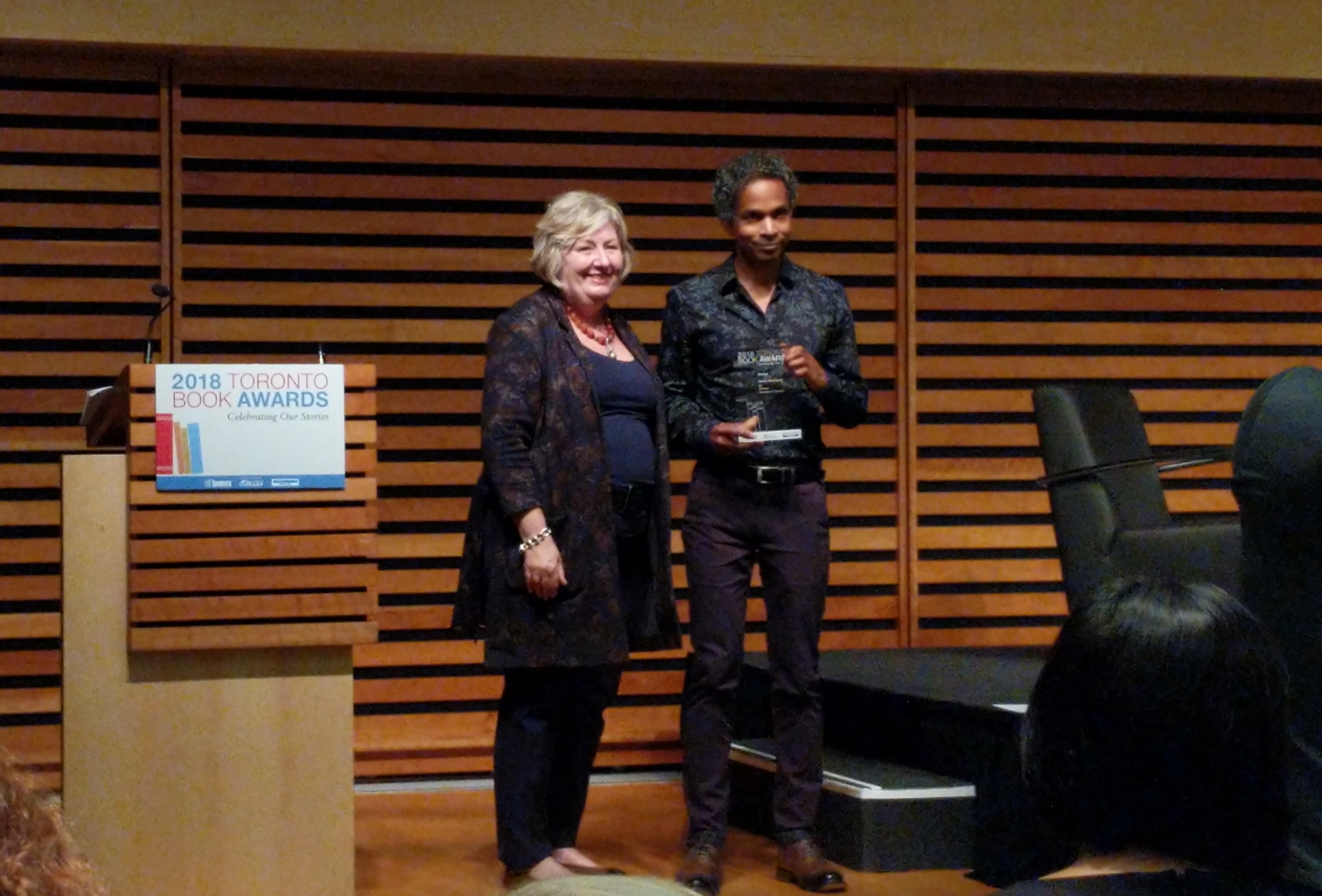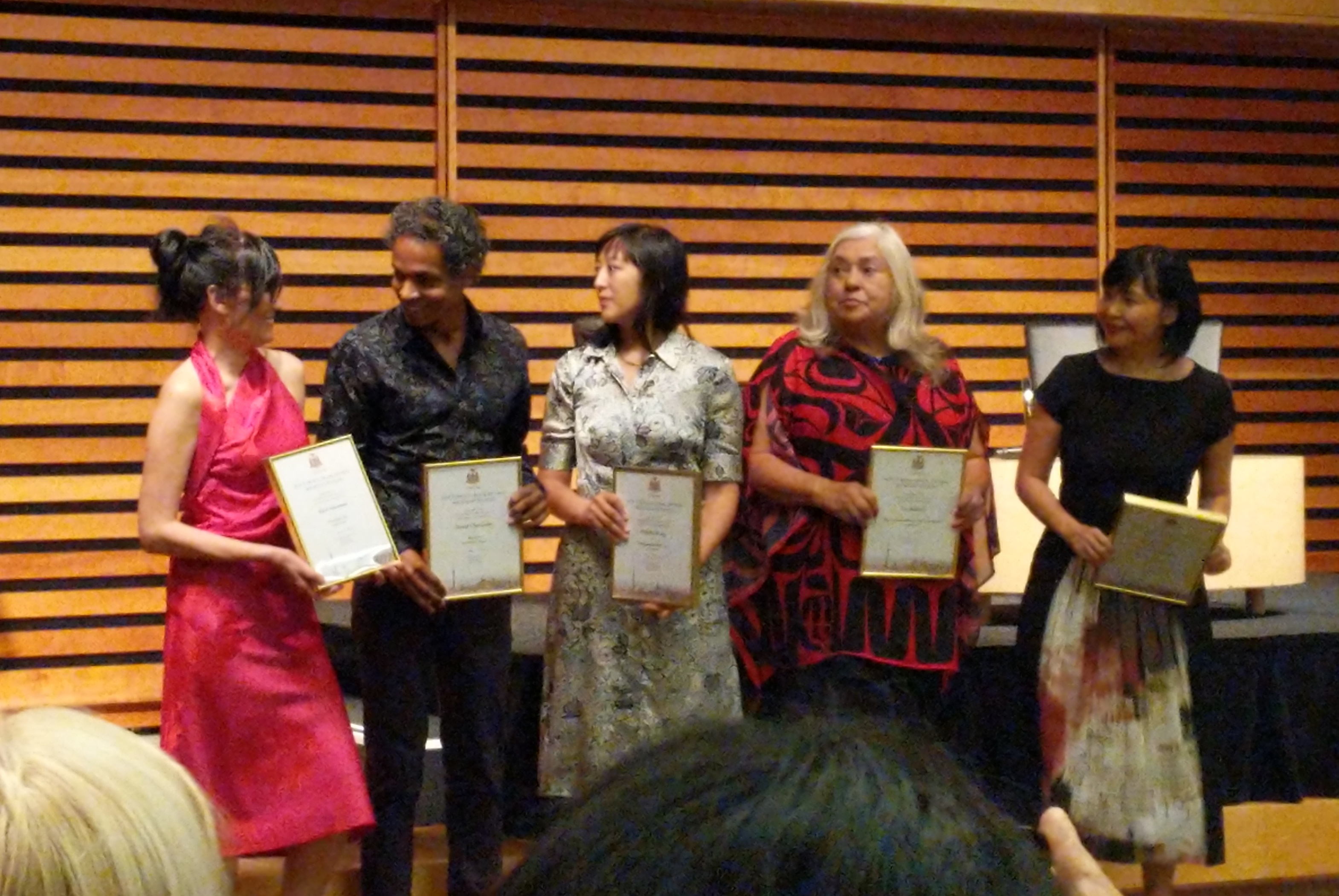David Chariandy wins the 2018 Toronto Book Award
Last night at the Toronto Reference Library, in front of an audience of avid readers and members of the publishing community, David Chariandy won the Toronto Book Award for his second, critically acclaimed novel, Brother.
Chariandy, who genuinely did not seem to think he would be the winner, followed with a heartfelt speech where he thanked the other formidable finalists for their work, and paid tribute to his family and friends in attendance, who so rarely get to see the now Vancouver based author read or participate in literary events. When Brother was announced as the winner, there was a loud pop from the crowd, where so many of Chariandy's Toronto and Scarborough supporters were seated.
This year's award yielded a strong shortlist, including legendary Sto:lo storyteller Lee Maracle, for her collection, My Conversations With Canadians, previous finalist Carrianne Leung, for That Time I Loved You, Kerri Sakamoto for her latest novel, Floating City, and, notably, the various emerging authors that filled the pages of The Published City, a collection of poetry and prose that was curated by Dionne Brand, and brought some of Toronto's most promising new authors into the fore.
Each of the finalists received $1000 for their shortlisting, with Chariandy winning the $10000 grand prize.
The five member jury was made up by journalist and critic Susan B. Cole, Trillium Award winning poet, Soraya Peerbaye, author Nathan Adler, storyteller and owner of A Different Booklist, Itah Sadu, and Trillium Award winning fiction writer, Kevin Hardcastle. This was the first year that a jury publicly named a longlist for the prize. The other books that made the longlist are:
- Ronna Bloom’s “The More“, published by Pedlar Press
- David Demchuk’s “The Bone Mother“, published by ChiZine Publications
- Jamil Jivani’s “Why Young Men“, published by Harper Collins
- David McPherson’s “The Legendary Horseshoe Tavern“, published by Dundurn
- Michael Redhill’s “Bellevue Square“, published by Doubleday Canada
- Jordan Tannahill & William Ellis, editors of “The Videofag Book“, published by BookThug
The jury's comments on the finalists are below, as catalogued on the Toronto Book Awards website, and read to the audience during the awards ceremony:
What the Jury Said: Brother
In a near flawless piece of writing, David Chariandy brings readers to a story that may very well feel both foreign and familiar. Brother, his second novel, is a lean masterwork driven by spare, painstakingly-crafted prose. No word is wasted in this book, and every word leaves a mark. In this world-building, or perhaps world-revealing novel, Chariandy casts off tropes that readers may expect from a story about family, violence, loss, and survival, and lets the heart of the novel, and its fully-drawn characters, dictate the course of the narrative. This book has already become part of the Toronto literary canon, and should reside there for ages.
What the Jury Said: The Unpublished City
The Unpublished City brings together a collection of diverse voices, a true cross-section of Toronto’s burgeoning literary community. These poems and short prose pieces reveal a series of lush vignettes through distinct voices that surprise and delight. The stories conjure Toronto’s city streets, its preoccupations and psychological pulse. From race relations to racial profiling, there are choices, paths, cute friendships, tragedies, cruelties, griefs, loves, losses and sadness. Here are fantasies of power through magic, the complications of sex, death in domesticity, the clash of home, homelands, journeys away, the rural, the urban, generational divides, ghosts and revelations, quirky visceral moments, an itch that will leave goosebumps. By turns gory and disturbing, morbidly funny, or charming and sweet, The Unpublished City highlights a talented crop of writers to watch out for.
What the Jury Said: That Time I Loved You
In That Time I Loved You, Carrianne Leung introduces us to a multitude of intertwined, felt and feeling lives in a Scarborough suburb. Her short stories are crafted like houses, separated by chain link fence. We dedicate ourselves to knowing each character, their hidden, fully inhabited interior; only to glimpse them again later in vivid, green glimpses, painfully undone. Probing love, loneliness, social injustice and the wish to be revealed, her characters stammer and blurt, say the wholly unexpected, their lives tender and brave on the tips of their tongues.
What the Jury Said: My Conversations With Canadians
In My Conversations with Canadians, groundbreaking Sto:Lo storyteller Lee Maracle brings her decades of experience in writing and performing to bear on this essential series of essays. Maracle speaks plainly and powerfully throughout, and her words demand our attention and consideration. At a crucial time when the realities of Canadian life and the trappings of Canadian Literature are being rightly re-examined, Maracle explores our most pressing cultural and societal problems – those that are starkly visible, and those that may seem subterranean to some readers. The concerns of this book are concerns that will resonate with Torontonians, and those who live in different communities all over this continent, and they are laid out with precision and passion in every line.
Your CanLit News
Subscribe to Open Book’s newsletter to get local book events, literary content, writing tips, and more in your inbox
What the Jury Said: Floating City
In this soulful yet whimsical meditation on ambition and familial fealty, Frankie moves from his floating home in Port Alberni B.C., to forced internment among others with Japanese roots during World War II and then to Toronto, where he connects to a couple that teaches him gardening. All along the way, Frankie finds ways to make money – not always in seemly ways – until his aspirations as a developer along Toronto’s waterfront stretch his moral fibre. With elements of magic realism, a strong intellectual component – Buckminster Fuller and his visionary ideas figure prominently – and a powerful emotional core, Floating Cityevokes Toronto’s ’50s history while remaining wholly relevant to the issues our city faces today.





